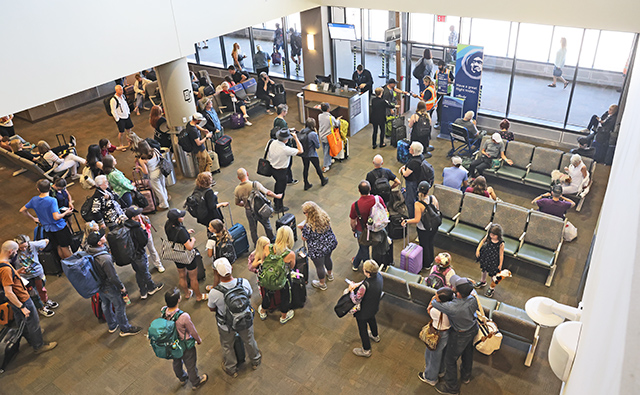Telecommuting … … and still working
Published 5:00 am Sunday, March 29, 2009

- Lloyd Fassett, president and founder of Azteria, an Internet company that uses software to match health care professionals and jobs in real time, works from his NorthWest Crossing office in Bend but stays in constant contact with his six far-flung employees. Fassett calls his 153-square-foot office his “world headquarters.” Lewis Howell, a technology consultant for Bend-based Cinetex Solutions, advises companies not to shy away from remote working in a down economy. “Telecommuters are good at collaborating and using team environments.”
Bend telecommuters are not immune to the wave of corporate layoffs and cost cutting. But despite the recession, many are thriving.
Some may fear working remotely in a down economy, worrying they may be the first ones cut, according to a report released in February by WorldatWork, a Washington, D.C.-based human resources trade group.
But local telecommuters and business consultants, particularly those in technology fields, say telecommuters are at no greater risk of job loss than their co-workers and may actually offer cost savings and other advantages that protect them from layoffs. That’s good news in Bend and other parts of Central Oregon, known for drawing top-level talent in search of recreation-filled living without big-city hassles.
Questions about telecommuting come at a time of myriad layoffs, including IBM Corp.’s recent decision to lay off about 5,000 U.S. employees as well as Hewlett-Packard Co.’s announcement in September that it would lay off 24,600 workers — half of them in the U.S. — over the next three years.
WorldatWork says that while occasional telecommuting has increased in the U.S. over the past few years, it estimates that the number of workers telecommuting “almost every day” has declined by 2.2 million between 2006 and 2008, to 13.5 million.
“We think that is the result of the economy,” said Marcia Rhodes, spokeswoman for WorldatWork. “As employers are downsizing, then teleworkers tend to put in more face time because they’re worried about job security.”
Technology-related telecommuters, however, might be more immune to the drop in full-time telecommuting, said Lewis Howell, a technology consultant with Bend-based Cinetex Solutions. “If anything, there is an opportunity to leverage telecommuters,” he said. “These are people who are good at collaborating and using team environments.”
The challenges of telecommuting — getting face time at the head office and staying connected with co-workers and supervisors — have evaporated with the advent of more technology and a more “virtual workplace,” Howell said. The virtual office world means being able to answer a phone call, conduct a meeting or work as part of a team anywhere in the world, he said.
“Now everyone is a virtual employee,” he said. “It really boils down to: Are you a good employee or a bad one?”
Telecommuters might see some perks taken away — such as company-paid flights to corporate headquarters, Internet connections or offices outside their homes — but ultimately, companies will see them as a cost savings, Howell said.
Bend, Sisters and the rest of the region have long been seen as places where tech professionals and retirees would relocate — and that growth took off thanks to the expansion of the region’s broadband network and increasing number flights out of Redmond Airport, said Ruth Lindley, marketing manager at Economic Development for Central Oregon, which promotes business expansion and retention in the region.
Lindley cited a 2005 article in Forbes magazine by Rich Karlgaard where Bend was rated as a “telecommuting heaven” as an example of the region’s attractiveness to wired tech professionals.
The presence of telecommuters in the region, which has not been quantified, is a boon for EDCO’s recruitment efforts because tech companies can relocate knowing that there is an ample supply of local talent, Lindley said.
Lloyd Fassett, president and founder of Azteria, an Internet company that uses special software to match health care professionals and jobs in real time, works remotely at his NorthWest Crossing office in Bend. He has six employees, including four in India and one in Los Angeles, he said.
He is not a telecommuter in the traditional sense, where he would work for a home office in a bigger city and report back to his corporate headquarters on a weekly or monthly basis. His company is more like a virtual company that lacks a notable office space, he said.
“This is the world headquarters,” he said, stretching out in his 153-square-foot office.
But he stays connected with his employees by different technological devices, including instant messaging and his G-Phone, a hand-held computer that allows him to e-mail, send instant messages and keep track of items on his calendar. The device also receives faxes and functions as a telephone.
In effect, the Internet has allowed Fassett to operate in a virtual office environment without the connection to a corporate headquarters, he said.
“Traditionally, you had to go to the main office, but today you don’t have to be part of the big company,” he said.
Large technology firms such as Santa Clara, Calif.-based Intel Corp. are encouraging workers to shift from more office-based employees to those who work remotely, said Bill MacKenzie, communications manager for Intel.
The company, which has 15,000 employees in Oregon, encourages its employees to telecommute if it works with their job positions, said MacKenzie, who could not estimate the number of workers from Central Oregon who telecommuted.
One of its new buildings in Oregon will have a floor that will be used solely by telecommuters, he said. The floor will allow them to plug in when they visit the main office without maintaining continuous office space.
While most telecommuters also will have desks at the corporate offices, Intel hopes the change to a more telecommuter-friendly environment will help recruit younger workers who prefer more work flexibility, MacKenzie said.
Employees also can save travel time and gas money by working remotely, he said.
“We are looking at creating more efficient space for telecommuters,” MacKenzie said. “We want to see if employees want to move away from the traditional cubicle environment.”
Matt Abrams, a local technology professional with California-based software giant Oracle, agreed that technology companies were putting more emphasis on telecommuting.
Companies are reducing workers, but it has nothing to do with telecommuting, he said.
“I don’t think that in the technology sector (companies) are changing how their employees are hired or not hired or employed or not employed,” Abrams said. “In the tech sector, it saves a lot of money to work remotely. As long as workers are still working successfully, I see no reason to pull back. Other industries, maybe.”






